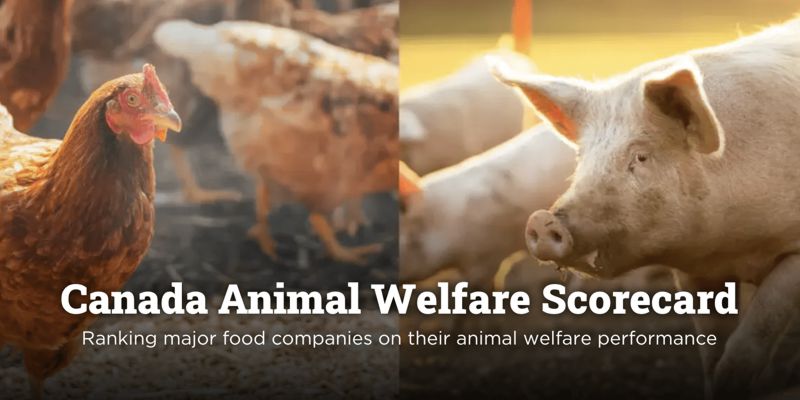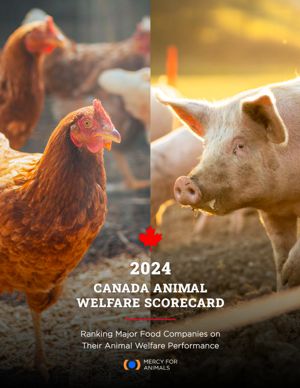Meaningful Steps – Western Grocer

Animal Welfare a Key Part of Sustainability
By Clara Hoita
Animal welfare is becoming a critical part of supply chain traceability as more consumers want to know how the animals behind their food are raised and treated. Many Canadian grocers are demonstrating meaningful steps, sourcing more humane products, but consumers are hungry for more transparency.
 According to Mercy For Animals’ 2024 Canada Animal Welfare Scorecard (the Scorecard) – which ranks major food companies on three of the most pressing animal welfare issues: cage confinement for laying hens; crate confinement for mother pigs; and the living conditions, breeding practices, and slaughter methods affecting chickens raised for meat – 36 per cent of grocery retailers have failed to disclose any progress, though many have pledged improvements.
According to Mercy For Animals’ 2024 Canada Animal Welfare Scorecard (the Scorecard) – which ranks major food companies on three of the most pressing animal welfare issues: cage confinement for laying hens; crate confinement for mother pigs; and the living conditions, breeding practices, and slaughter methods affecting chickens raised for meat – 36 per cent of grocery retailers have failed to disclose any progress, though many have pledged improvements.
In 2016, members of the Retail Council of Canada (RCC), including Loblaws, Sobeys, and Save On Foods, voluntarily committed to sourcing 100% gestation-crate-free pork by 2022 and cage-free eggs by 2025. However, in 2021, the RCC backtracked on their commitments, leaving grocery members to determine the status of their own policies.
According to the Scorecard, Loblaws was among the first to reaffirm their commitment to
phasing out confinement, with an acknowledgement that original timelines would not be met. In their updated animal welfare principles, published in late 2023, the company states intention to transition to 100 per cent cage-free eggs “as soon as possible” and have targeted a 60% conversion to group-housed pork by year-end. Loblaws will also begin disclosing cage-free egg sales data and promote cage-free options through customer education.
Save-On-Foods became one of the first retailers in North America to help consumers make informed choices at the store level with in-store egg shelf labelling that distinguished between cage-free eggs (free-run, free-range, and organic) and those from battery cage farms. The grocer reports cage-free egg sales have varied, peaking at 46 per cent in previous years and recently at 38 per cent in 2024. Save-On-Foods plans to expand labelling across all stores and will continue to work with suppliers to source cage-free options over time to “fulfill what we expect as increased demand.” The retailer also reported that 48 per cent of its fresh pork is now crate-free, while also beginning to share standards for chickens raised for meat.
Increased certification options have also empowered consumers to make ethical food choices. Programs like Global Animal Partnership (GAP) ensure higher care standards through independent inspections, exceeding Canada’s baseline Codes of Practice.
In June, Whole Foods, which ranks Gold Tier in the current Scorecard, added certifications from A Greener World and Humane Farm Animal Care to its GAP standards for meat products.
“We have a legacy at Whole Foods Market of selling products customers can trust through our quality standards,” said Wes Rose, Vice President of Perishables at Whole Foods Market. “Expanding the scope of our meat standards is just another step forward in providing high quality choices for our customers.”
As consumer awareness grows, the Dairy Farmers of Canada (DFC) focus on transparent communication through their More Goodness program. Launched this spring, it provides deals on dairy products and information on the sector’s commitments to sustainability, nutrition, and animal care.
“Consumers are ethically minded, and they want to know that beyond quality, the industries and brands they support are sustainable and that they share their values – including those around animal care,” says Lucie Boileau, director, strategic communications for the Dairy Farmers of Canada (DFC). “Understanding consumer needs is vital to the growth of our industry, which is why we need to continue to listen closely to what consumers want and show them that dairy’s values are aligned to theirs.”
Boileau adds they are also putting the final touches on a microsite showcasing the practices behind their proAction quality assurance program, which supports high animal welfare standards for dairy farms bearing the iconic Blue Cow Logo.
“We respond to consumer enquiries [about animal welfare] with facts and data. This is the best way to debunk myths about dairy and animal agriculture in general. With proAction, we are able to direct consumers to information that supports our animal care practices, showing in transparent ways that dairy farmers put the health of their herds at the forefront. When you have a program that measures and records progress, it is easier to respond to consumer questions because our answers are based on real farmer actions,” she says, adding the program, which is mandatory for all Canadian dairy farms is designed with checks and balances to ensure conformance, transparency, and accountability.
Enhancing animal welfare is one important step towards a more sustainable future.
Source: westerngrocer.com

